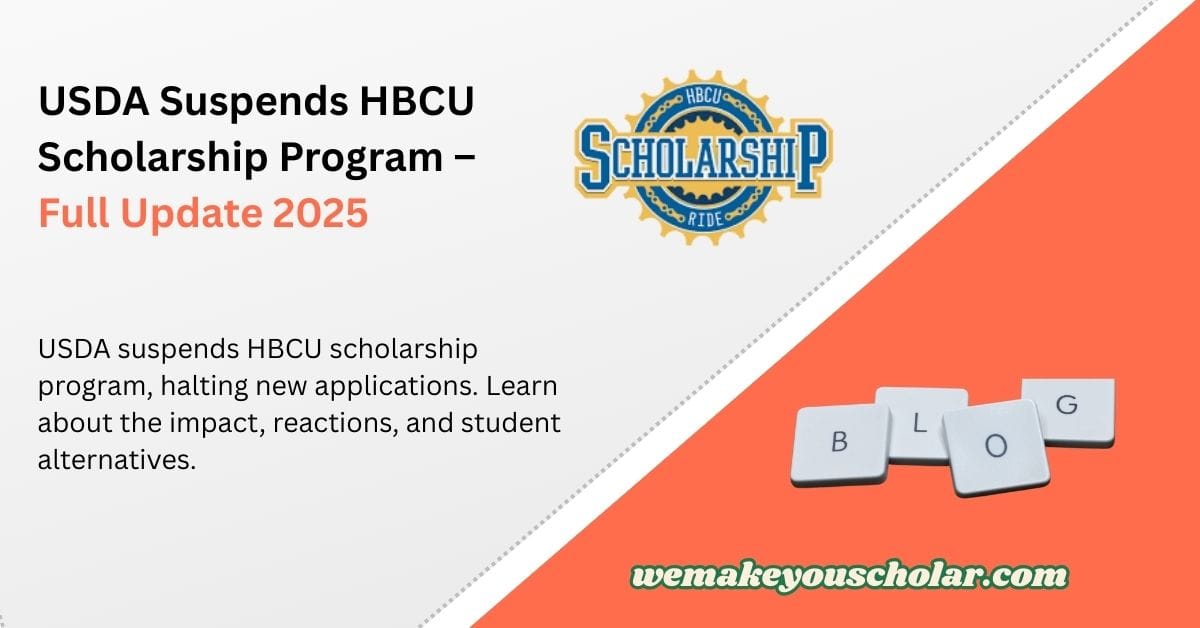USDA Suspends HBCU Scholarship Program: What Students Need to Know
In February 2025, the U.S. Department of Agriculture (USDA) had suspended its HBCU scholarship program—formally known as the 1890 National Scholars Program. The decision shocked students, faculty, and policymakers as students from Historically Black Colleges and Universities (HBCUs) are engaged in the fields of agriculture, food science, natural resources, and public service.
What Was the USDA 1890 National Scholars Program?
The 1890 National Scholars Program was created to support students at the 19 land-grant Historically Black Colleges and Universities. It was established under the Second Morrill Act of 1890 and its mission was following:
Provide full tuition, room, board, and fees for selected students.
Offer professional internships with the USDA.
Guarantee a career pipeline into USDA positions after graduation.
Please note that the program helped hundreds of students over the decades who enter careers in agriculture, food systems, and natural resource management. By 2024, the program had awarded around $19.2 million to support 94 students in just that year.
USDA Suspends HBCU Scholarship Program: What Happened?
The USDA explained the suspension as part of a broader review of federal programs to ensure compliance with executive orders issued by the Trump administration. These orders demanded a review of initiatives related to climate, diversity, equity, and inclusion (DEI).
While the USDA clarified that over 300 current scholars could continue their studies, no new students would be accepted for the foreseeable future. This left graduating high school seniors and HBCU applicants scrambling for alternatives.
Financial Impact on Students and Universities
The immediate financial consequences of this suspension were severe. HBCUs like Kentucky State University, Tuskegee University, and North Carolina A&T State University were especially hard hit because of their strong agricultural science programs that relied on these scholarships to attract and retain talent.
Political and Social Reactions
The suspension quickly drew national criticism.
Representative Alma Adams (D-NC), co-founder of the Congressional Bipartisan HBCU Caucus, called the move “a clear attack on an invaluable program that makes higher education accessible for everybody.”
Civil rights organizations condemned the suspension as undermining decades of progress in racial equity and inclusion.
Faculty and administrators at HBCUs expressed frustration that this decision came without warning and risked weakening partnerships built between USDA and their institutions.
Why This Program Mattered for HBCUs
The USDA 1890 National Scholars Program was not just another scholarship—it was a pipeline for racial equity and workforce diversity.
Representation in agriculture. Black professionals remain underrepresented in agricultural sciences and USDA leadership roles.
First-generation support. Many recipients were the first in their families to attend college.
Economic uplift. Graduates entered stable, well-paying USDA positions, strengthening economic mobility for families and communities.
HBCU sustainability. The program boosted enrollment at land-grant HBCUs, which often face financial instability.
Suspending the program threatens to undo years of progress in building a diverse agricultural workforce—a workforce crucial for solving food security, climate change, and rural development challenges.
Comparisons to Past Federal Scholarship Cuts
This is not the first time that federal programs serving HBCUs have faced setbacks.
1980s cuts to Pell Grant expansions disproportionately hurt minority students.
2000s rollbacks in funding for STEM-focused diversity initiatives reduced pathways for underrepresented groups.
The USDA itself has a complicated history with racial discrimination, having faced lawsuits in the 1990s and 2000s over discriminatory lending practices toward Black farmers.
The suspension of the 1890 Scholars Program feels, to many, like part of this troubling legacy.
What Happens to Current Scholars?
The USDA has stated that current scholars—over 300 across the 19 HBCUs—will be allowed to finish their programs.
This means:
Their tuition and living expenses will continue to be covered.
Their internships and USDA career pipeline opportunities remain intact.
However, no new students can apply, leaving future cohorts uncertain. For high school seniors who had been preparing to apply, the door has effectively been shut.
Wider Policy Context
The USDA’s suspension of this program cannot be seen in isolation. It is tied to a larger political environment where federal agencies are reassessing programs with DEI and climate components.
President Trump’s 2025 executive orders called for:
Reviewing climate-related funding across federal agencies.
Evaluating diversity and inclusion programs for alignment with “core agency missions.”
Pausing or freezing funding where programs were deemed inconsistent.
Long-Term Implications for HBCUs and Agriculture
If the program remains suspended, several long-term consequences are likely:
Reduced pipeline of Black agricultural scientists. Without guaranteed scholarships, fewer students may pursue careers in USDA fields.
Widening racial gaps. The already low representation of Black professionals in agriculture may decline further.
Institutional strain on HBCUs. Universities lose both funding and prestige associated with the USDA partnership.
National workforce shortages. Agriculture and food science industries face ongoing labor shortages—diverse talent pools are critical.
In short, the suspension risks weakening both HBCUs and the nation’s agricultural future.
Possible Next Steps
What happens now? Several avenues are being discussed:
Congressional action. Lawmakers may push for reinstatement through appropriations or legislation.
Lawsuits. Civil rights groups could challenge the suspension on grounds of discrimination.
Advocacy campaigns. Students, alumni, and faculty are mobilizing to pressure USDA to restore the program.
Private alternatives. Foundations and nonprofits may step in to offer replacement scholarships.
The future of the USDA 1890 National Scholars Program remains uncertain, but advocacy will play a key role in shaping outcomes.
What Students Can Do Now
If you were planning to apply to the USDA HBCU scholarship program, you still have options:
1. Explore Alternative USDA Scholarships
While the 1890 program is suspended, USDA offers other opportunities:
USDA Wallace Carver Fellows Program
USDA Pathways Internship Program
2. Apply for Private HBCU Scholarships
Foundations such as:
Thurgood Marshall College Fund (TMCF)
United Negro College Fund (UNCF)
Jackie Robinson Foundation
3. Seek State and Institutional Aid
Many HBCUs offer merit-based and need-based awards directly to students.
4. Broaden Your Applications
Consider scholarships in STEM, agriculture, and public service fields that are not USDA-specific.
Conclusion
The suspension of the USDA HBCU scholarship program is more than just a policy change—it is a decision that affects students, families, universities, and the agricultural workforce of the United States.
For decades, the 1890 Scholars Program provided a model of equity, access, and opportunity. Its suspension leaves a gap that must be filled if we are to ensure that agriculture and food systems benefit from the talents of all Americans.
Students should stay informed, pursue alternative funding, and join advocacy efforts to push for the program’s return.
For more informative blogs, please visit our Blog section.




